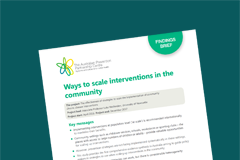Ways to scale interventions in the community
Implementing interventions at scale is the best way of maximising their benefits. This seminal project consolidated the evidence base on the effectiveness of implementation strategies in community settings. Download the Findings Brief PDF for a a summary of the project's findings.
Key messages
- Implementing interventions at population level (‘at scale’) is recommended internationally to maximise their benefits.
- Community settings such as childcare services, schools, workplaces or sporting clubs – the places with access to large numbers of children or adults – provide valuable opportunities for scaling up interventions.
- However, prevention strategies are not being implemented systematically in these settings.
- This study provides the first comprehensive evidence synthesis in Australia aiming to guide policy makers in strategies to use when scaling up interventions in the community.
- We found implementation strategies can work, but there is considerable heterogeneity in their impact.
- Overall, the effects of implementation strategies are modest.
- Researchers are often not using implementation theory or frameworks.
- The evidence base is still developing: there is no ‘recipe’ for how to scale up interventions in community settings in Australia.
- Best practice for now is to understand the barriers to implementation and select implementation strategies that specifically address those barriers.
- Co-production is a good way of ensuring implementation is feasible in community settings.
